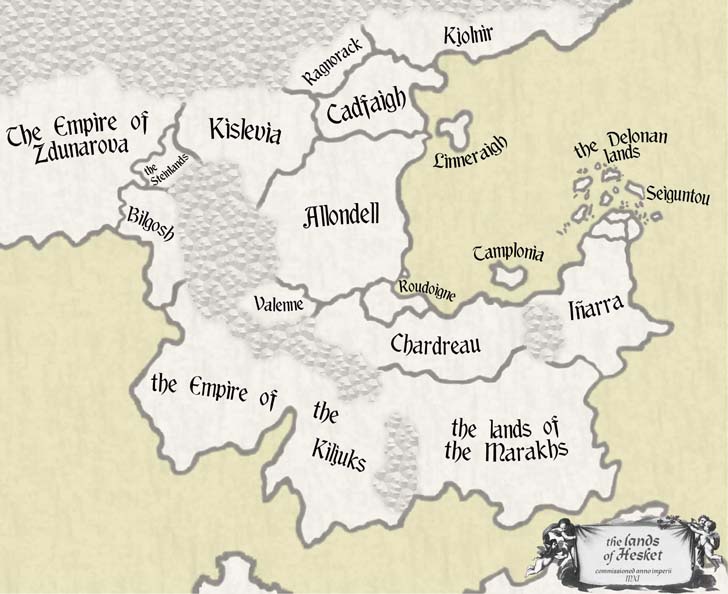The World of the Continuing Game
Introduction
The Continuing Game world is a fantasy world, combining features of the late medieval period with magical and unearthly elements.
As a player, you don't have to know the whole world. The CG was designed to provide you with common cultural archetypes, so that if you are thinking "I want to play a Viking" or "I want to play a Spaniard," there is a country for your character (see below). But if your country of origin doesn't much matter, you can simply default to Allondell, which is a "generic fantasy" (that is to say, England-like) country.
Either way, you may wish to skim the information on the various countries. It might give you an idea for an interesting character, and many Quest games will incorporate elements of the game world into their stories and plots.
Cultural Parallels
You can start with an quick overview of the countries, or click on a country's name below to get a more detailed entry on that land:
| Country | Reminiscent of... |
|---|---|
| Allondell | English/"generic fantasy" |
| Bilgosh | southern Europe (Hungary, Romania, etc.) |
| Cadfaigh | Scottish |
| Chardreau | French |
| Delona | Italian, Greek, Maltese, other Mediterranean |
| Iñarra | Spanish, Portuguese |
| Kiljukan | Turkish/Ottoman |
| Kislevia | German |
| Kjolnir | Scandinavian/Viking |
| Linneraigh | Celtic (Ireland, Wales) |
| Marakhin | Arabian |
| Ragnorack | (none—a cultural mix of German, Scottish, and Scandinavian) |
| Roudoigne | Belgian, Luxembourg |
| Shenga | sub-Saharan African |
| Steinlands | Austria/Prussia/Czech |
| Tamplonia | Spain/France border regions: Catalonia, Navarre, Roussillon, etc. |
| Valenne | Northern France with British influence: Normandy, Brittany, Calais, etc. |
| Yamamoto | Japanese |
| Zdunarova | northern Slavic (Russia, Poland, etc.) |
The main continent is known as Hesket, a term approximating to "Europe." It is a region stretching from the Great Wastelands in the west to the eastern horn of Iñarra, and includes all the nearby islands. The residents are referred to as "Hesketines." The term "Hesketine" includes mahiri and dwarves, since the civilized races of Hesket often have more in common with one another than they do with people from other continents.
While the Kiljuks and Marakhs might occupy part of the same continent, those from the so-called civilized or "Northern" countries are quick to separate themselves from these "Southern" lands.

Additional Information
Feudalism
Human culture in this era has a social structure that is more defined than that of modern Earth, yet more flexible than medieval Earth. At the top of human society are the monarchs, who rule by the grace of the gods ("divine right"). This is a generally accepted doctrine, and it is important to role-play this. As the king or queen rules by divine right, he or she is deserving of respect, and the desire to serve the king or queen is the counterpart to an American's devotion to the Constitution. The monarchs in turn are served by (and appoint) vassals, the nobles and knights. Next are the freemen. At the bottom are the serfs, or peasants who are bound to the land. (Because of this restriction on mobility, no PC is ever assumed to be a serf. PCs are assumed to be freemen by default.)
"Democracy" exists at some levels, but is usually exclusionary in some form. Village councils may be limited to freemen; guilds only allow full members the franchise; city-state "republics" may only allow landowners to vote. However, the notion of nationwide democracy as a form of government is alien and usually deemed impractical; moreover it conflicts with divine right.
Gender
Unlike in medieval Europe, the prevailing norm in the Continuing Game's human society is gender equality, and women have equal or equivalent opportunities to men. Thus, in general, daughters of nobles inherit equally with sons, and women can occupy the same positions as men, including in the military (Hesket's armies feature many knights who go by "Dame" instead of "Sir"). On the flipside, historically feminine roles are open to men without stigma; male weavers and spinners sit alongside female ones, and milkboys work beside the milkmaids.
Thus, heroes in the CG don't as a rule protect "innocent women and children," since many women are able to protect themselves, and many men are not. (Plus, many heroes are themselves women!) Instead, they protect "the innocent and children." Some areas or people may exist that deviate from this norm, but should be regarded as odd, aberrant, backward and/or unjust.
Timekeeping
Months and days are reckoned the same as in the "real world," and time passes in-game as fast as it does out-of-game. Years are reckoned from the crowning of the first Emperor of the old Sturian Empire: "anno Imperii." Simply subtract 1000 from the real-world Christian Era year. For example, when this page was edited, the Christian dating was December 22, 2008 A.D.; in-game, it would be December 22, 1008 A.I.
We use this "subtract 1000" scheme out of convenience. Technologically, Hesket is in its Later Middle Ages, and is equal to Europe at about the year 1400, not 1000. (The difference in date is because Sturia crowned its first Emperor "later" than Rome did.)
